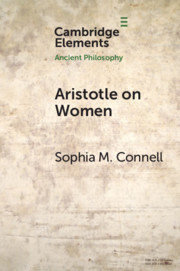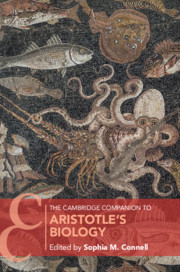40 results
Chapter 3 - Women’s Medical Knowledge in Antiquity
-
-
- Book:
- Ancient Women Philosophers
- Published online:
- 17 August 2023
- Print publication:
- 31 August 2023, pp 57-76
-
- Chapter
- Export citation

Aristotle on Women
- Physiology, Psychology, and Politics
-
- Published online:
- 29 July 2021
- Print publication:
- 12 August 2021
-
- Element
- Export citation
Index Locorum
-
- Book:
- The Cambridge Companion to Aristotle's Biology
- Published online:
- 14 May 2021
- Print publication:
- 27 May 2021, pp 351-355
-
- Chapter
- Export citation
Chapter 12 - Animal Cognition in Aristotle
-
-
- Book:
- The Cambridge Companion to Aristotle's Biology
- Published online:
- 14 May 2021
- Print publication:
- 27 May 2021, pp 195-210
-
- Chapter
- Export citation
Abbreviations
-
- Book:
- The Cambridge Companion to Aristotle's Biology
- Published online:
- 14 May 2021
- Print publication:
- 27 May 2021, pp xii-xviii
-
- Chapter
- Export citation
Bibliography
-
- Book:
- The Cambridge Companion to Aristotle's Biology
- Published online:
- 14 May 2021
- Print publication:
- 27 May 2021, pp 310-343
-
- Chapter
- Export citation
Introduction
-
-
- Book:
- The Cambridge Companion to Aristotle's Biology
- Published online:
- 14 May 2021
- Print publication:
- 27 May 2021, pp 1-11
-
- Chapter
- Export citation
Copyright page
-
- Book:
- The Cambridge Companion to Aristotle's Biology
- Published online:
- 14 May 2021
- Print publication:
- 27 May 2021, pp iv-iv
-
- Chapter
- Export citation
Chapter 9 - Aristotle on Animal Generation and Hereditary Resemblance
-
-
- Book:
- The Cambridge Companion to Aristotle's Biology
- Published online:
- 14 May 2021
- Print publication:
- 27 May 2021, pp 142-158
-
- Chapter
- Export citation
Contents
-
- Book:
- The Cambridge Companion to Aristotle's Biology
- Published online:
- 14 May 2021
- Print publication:
- 27 May 2021, pp v-vi
-
- Chapter
- Export citation
Figures
-
- Book:
- The Cambridge Companion to Aristotle's Biology
- Published online:
- 14 May 2021
- Print publication:
- 27 May 2021, pp vii-vii
-
- Chapter
- Export citation
General Index
-
- Book:
- The Cambridge Companion to Aristotle's Biology
- Published online:
- 14 May 2021
- Print publication:
- 27 May 2021, pp 344-350
-
- Chapter
- Export citation
Contributors
-
- Book:
- The Cambridge Companion to Aristotle's Biology
- Published online:
- 14 May 2021
- Print publication:
- 27 May 2021, pp viii-xi
-
- Chapter
- Export citation

The Cambridge Companion to Aristotle's Biology
-
- Published online:
- 14 May 2021
- Print publication:
- 27 May 2021
Bibliography
-
- Book:
- Aristotle on Female Animals
- Published online:
- 18 December 2015
- Print publication:
- 14 January 2016, pp 380-406
-
- Chapter
- Export citation
5 - The male as efficient and formal cause of generation
- from Part III - Re-assessing the generative role of the male animal in Aristotle
-
- Book:
- Aristotle on Female Animals
- Published online:
- 18 December 2015
- Print publication:
- 14 January 2016, pp 163-180
-
- Chapter
- Export citation
Dedication
-
- Book:
- Aristotle on Female Animals
- Published online:
- 18 December 2015
- Print publication:
- 14 January 2016, pp v-vi
-
- Chapter
- Export citation
Acknowledgements
-
- Book:
- Aristotle on Female Animals
- Published online:
- 18 December 2015
- Print publication:
- 14 January 2016, pp xi-xii
-
- Chapter
- Export citation
4 - Matter
- from Part II - Re-assessing the generative role of the female animal in Aristotle
-
- Book:
- Aristotle on Female Animals
- Published online:
- 18 December 2015
- Print publication:
- 14 January 2016, pp 121-160
-
- Chapter
- Export citation
General index
-
- Book:
- Aristotle on Female Animals
- Published online:
- 18 December 2015
- Print publication:
- 14 January 2016, pp 427-437
-
- Chapter
- Export citation



